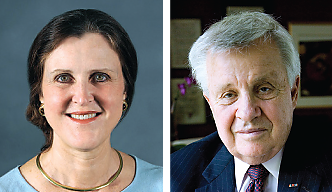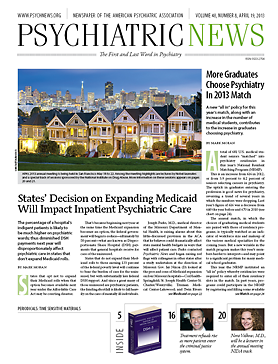Gun violence has made public policy concerning mentally ill individuals a topic for debate in the popular media. Unfortunately cynical and politically expedient solutions often predominate in this forum. In a particularly egregious example, immediately after the Newtown school shooting, the National Rifle Association’s Wayne LaPierre attempted to deflect limits on guns by calling for a national registry individuals with mental illness.
On February 3, he appeared on Fox News calling for reinstitutionalization of people with mental illness. In each instance, there was no psychiatrist on the set to rebut his misinformed and stigmatizing rhetoric. Left unchallenged, he had a solo platform from which to shape public opinion.
Not that psychiatry has been silent. Through press releases and testimony, APA has opposed the notion that the solution to gun violence is greater regulation of people with mental illness. For example, former APA President Paul Appelbaum, M.D., testified before Vice President Joseph Biden’s Task Force on Gun Violence that 96 percent of violence in the U.S. is not committed by people with mental illness, and only 7 percent of individuals with schizophrenia commit any act of violence, including pushing and shoving (Psychiatric News, March 1).
These public statements are extremely important, but the question remains, why is psychiatry relatively silent in the broader public forum—the talk shows, network news, and cable TV, where public opinion is formed?
We suspect the silence is self-imposed. As a profession, our public engagement is guided by Section 7 of the
Principles of Medical Ethics With Annotations Especially Applicable to Psychiatry (posted on APA’s Web site at
http://www.psych.org/practice/ethics). Unfortunately this principle is plagued by internal contradiction and may go too far in trying to serve its original intent.
Subsections 1 and 2 exhort psychiatrists to “serve society” and “share with the public their expertise.” News releases and testimony are good and important examples of this. Subsection 3, known as the Goldwater Rule, is the key. It was prompted by controversy that arose during the 1964 presidential campaign. Fact Magazine surveyed APA members asking whether the Republican candidate, Barry Goldwater, was fit for office. The front-page story under the headline “1189 Psychiatrists Say Goldwater Is Psychologically Unfit to be President” was a major embarrassment for American psychiatry.
Section 7.3 of the ethics code, which states, “It is unethical for a psychiatrist to offer a professional opinion unless he/she has conducted an examination and has been granted proper authorization,” was adopted to avoid such wild analysis of an individual’s mental state.
Unfortunately, it restricts the ability of a psychiatrist to offer opinions in a public forum. But like it or not, public opinion forms in reaction to highly publicized individual cases that are the staple of the popular media. When we shy away from the debate, we lose the opportunity to educate the public, inform policy, and counter the stigmatization of people living with mental illness. By failing to offer an opinion, operating under a “better safe than sorry” interpretation of professional opinion, we in some ways undermine the integrity of the profession rather than preserve it.
Unless we address the issues raised by the case currently seizing the public attention, the opportunity to inform and influence the debate will be lost. In an op-ed piece in the New York Times concerning the Newtown shootings, Dr. Paul Steinberg noted “the chilling effect of the Goldwater Rule” in his effort to frame and qualify his comments. We believe that disproportionate concern about the “chilling” effect of Section 7.3 prevents more psychiatrists from engaging in arenas where sharing their expertise might educate the public and lead to a more reasoned approach to curbing gun violence.
Many psychiatrists choose to remain silent when their voices need to be heard so that psychiatric patients are not casually depicted as unpredictable and violent. In an effort to avoid a sin of commission, we have adopted a rule that now leads to a sin of omission. This suggests revisiting Section 7. One solution would be making 7.3 more specific, prohibiting a specific clinical diagnosis rather than stating it is “unethical for psychiatrists to offer a professional opinion,” which is indeed so broad as to be chilling. This will permit informed discussion of issues arising from specific cases without offering a diagnosis.
The loosening of this prohibition would enable APA members to step forward to inject science and experience into the debate and counter the demonization of our patients. This requires not just testifying before commissions and publishing in the print media. It requires a more vigorous and proactive public-relations effort and a presence on the Sunday talk shows and electronic media so that the spokesmen for extremism are never again given a solo platform. ■

